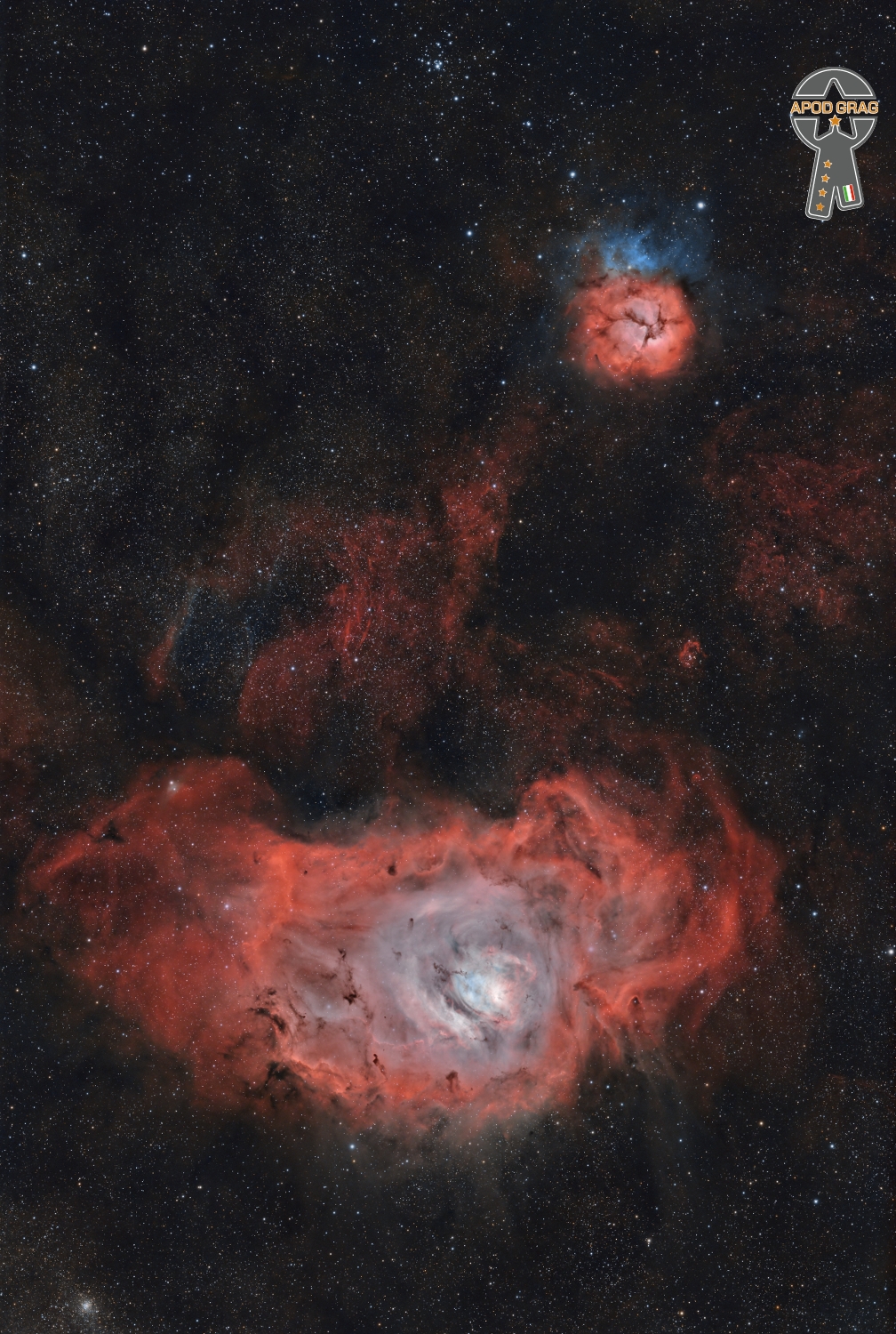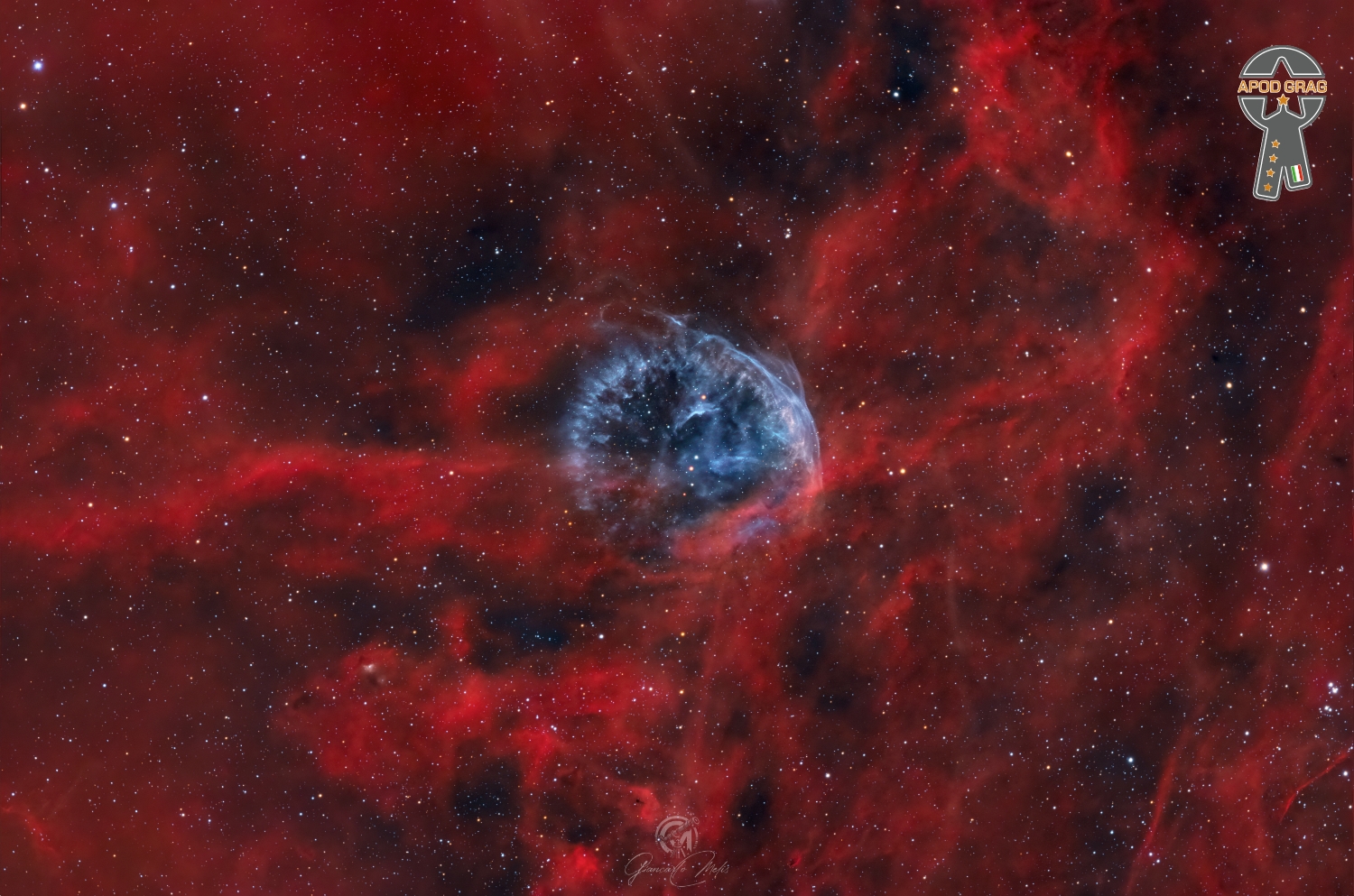Blog
The Lagoon Nebula (catalogued as Messier 8 or M8, NGC 6523, Sharpless 25, RCW 146, and Gum 72) is a giant interstellar cloud in the constellation Sagittarius. It is classified as an emission nebula and has an H II region.
The Lagoon Nebula was discovered by Giovanni Hodierna before 1654 and is one of only two star-forming nebulae faintly visible to the eye from mid-northern latitudes. Seen with binoculars, it appears as a distinct cloud-like patch with a definite core. Within the nebula is the open cluster NGC 6530. 4100ly
The Trifid Nebula (catalogued as Messier 20 or M20 and as NGC 6514) is an H II region in the north-west of Sagittarius in a star-forming region in the Milky Way’sScutum–Centaurus Arm. It was discovered by Charles Messier on June 5, 1764. Its name means ‘three-lobe’. The object is an unusual combination of an open cluster of stars, an emission nebula (the relatively dense, reddish-pink portion), a reflection nebula(the mainly NNE blue portion), and a dark nebula (the apparent ‘gaps’ in the former that cause the trifurcated appearance, also designated Barnard 85). Viewed through a small telescope, the Trifid Nebula is a bright and peculiar object, and is thus a perennial favorite of amateur astronomers.

more...
Hamid Drake (born August 3, 1955 Monore, LA) is an American jazz drummer and percussionist.
By the close of the 1990s, Hamid Drake was widely regarded as one of the best percussionists in jazz and improvised music. Incorporating Afro-Cuban, Indian, and African percussion instruments and influence, in addition to using the standard trap set, Drake has collaborated extensively with top free jazz improvisers. Drake also has performed world music; by the late 1970s, he was a member of Foday Musa Suso’sMandingo Griot Society[1] and has played reggae throughout his career.[2]
Drake has worked with trumpeter Don Cherry, pianist Herbie Hancock, saxophonists Pharoah Sanders, Fred Anderson, Archie Shepp and David Murray, and bassists Reggie Workman and William Parker (in many lineups).
Drake studied drums extensively, including eastern and Caribbean styles. He frequently plays without sticks, using his hands to develop subtle commanding undertones. His tabla playing is notable for his subtlety and flair. Drake’s questing nature and his interest in Caribbean percussion led to a deep involvement with reggae.
more...Roscoe Mitchell (born August 3, 1940 Chicago) is an American composer, jazzinstrumentalist, and educator, known for being “a technically superb – if idiosyncratic – saxophonist”. The Penguin Guide to Jazz described him as “one of the key figures” in avant-garde jazz; All About Jazz stated in 2004 that he had been “at the forefront of modern music” for more than 35 years. Critic Jon Pareles in The New York Times has mentioned that Mitchell “qualifies as an iconoclast”. In addition to his own work as a bandleader, Mitchell is known for cofounding the Art Ensemble of Chicago and the Association for the Advancement of Creative Musicians (AACM).
more...Anthony Dominick Benedetto (August 3, 1926 – July 21, 2023), known professionally as Tony Bennett, was an American jazz and traditional pop singer. He received many accolades, including 20 Grammy Awards, a Lifetime Achievement Award, and two Primetime Emmy Awards. Bennett was named an National Endowments for the Arts Jazz Master and a Kennedy Center Honoree and founded the Frank Sinatra School of the Arts in Astoria, Queens, New York. He sold more than 50 million records worldwide and earned a star on the Hollywood Walk of Fame.
Bennett began singing at an early age. He fought in the final stages of World War II as a U.S. Army infantryman in the European Theater. Afterward, he developed his singing technique, signed with Columbia Records and had his first number-one popular song with “Because of You” in 1951. Several popular tracks such as “Rags to Riches” followed in early 1953. He then refined his approach to encompass jazz singing. He reached an artistic peak in the late 1950s with albums such as The Beat of My Heartand Basie Swings, Bennett Sings. In 1962, Bennett recorded his signature song, “I Left My Heart in San Francisco“. His career and personal life experienced an extended downturn during the height of the rock music era. Bennett staged a comeback in the late 1980s and 1990s, putting out gold record albums again and expanding his reach to the MTV Generation while keeping his musical style intact.
Bennett continued to create popular and critically praised work into the 21st century. He attracted renewed acclaim late in his career for his collaboration with Lady Gaga, which began with the album Cheek to Cheek (2014); the two performers toured together to promote the album throughout 2014 and 2015. With the release of the duo’s second album, Love for Sale (2021), Bennett broke the individual record for the longest run of a top-10 album on the Billboard 200 chart for any living artist; his first top-10 record was I Left My Heart in San Francisco in 1962. Bennett also broke the Guinness World Recordfor the oldest person to release an album of new material, at the age of 95 years and 60 days.
In February 2021, Bennett revealed that he had been diagnosed with Alzheimer’s disease in 2016. Due to the slow progression of his illness, he continued to record, tour, and perform until his retirement from concerts due to physical challenges, which was announced after his final performances on August 3 and 5, 2021, at Radio City Music Hall.
more...Eddie Jefferson (August 3, 1918 – May 9, 1979) was an American jazz vocalist and lyricist. He is credited as an innovator of vocalese, a musical style in which lyrics are set to an instrumental composition or solo. Jefferson himself claims that his main influence was Leo Watson. Perhaps Jefferson’s best-known song is “Moody’s Mood for Love” which was recorded in 1952, though two years later a recording by King Pleasurecatapulted the contrafact into wide popularity (King Pleasure even cites Jefferson as a personal influence). Jefferson’s recordings of Charlie Parker‘s “Parker’s Mood” and Horace Silver‘s “Filthy McNasty” were also hits.
Jefferson was born in Pittsburgh, Pennsylvania, United States. One of his most notable recordings, “So What“, combined the lyrics of artist Christopher Acemandese Hall with the music of Miles Davis to highlight his skills, and enabled him to turn a phrase, into his style he calls jazz vocalese. Eddie Jefferson was shot and killed outside Baker’s Keyboard Lounge on May 8, 1979, aged 60. He had left the club with fellow bandleader Cole around 1:35 a.m. and was shot while walking out of the building. A late-model Lincoln Continental was spotted speeding away from the scene. The driver was later picked up by Detroit police and identified as a disgruntled dancer with whom Jefferson once worked and had fired from a gig. The suspect Bill Perryman was charged with murder, but was later acquitted in a Detroit criminal trial.
more...Accompanying the Shabbat Service at Temple Israel Friday August 2nd 2024 6pm with Inbal Sharett-Singer, Jayson Rodovsky, Jeff Bailey, Pete Whitman and mick laBriola.
more...
WR 134 is a variable Wolf-Rayet star located around 6,000 light years away from Earth in the constellation of Cygnus, surrounded by a faint bubble nebula blown by the intense radiation and fast wind from the star. It is five times the radius of the sun, but due to a temperature over 63,000 K it is 400,000 times as luminous as the Sun.
WR 134 was one of three stars in Cygnus observed in 1867 to have unusual spectra consisting of intense emission lines rather than the more normal continuum and absorption lines. These were the first members of the class of stars that came to be called Wolf-Rayet stars (WR stars) after Charles Wolf and Georges Rayet who discovered their unusual appearance.

more...
Nicola James Capaldi (2 August 1944 – 28 January 2005) was an English singer-songwriter and drummer. His musical career spanned more than four decades. He co-founded the progressive rock band Traffic in 1967 with Steve Winwood with whom he co-wrote the majority of the band’s material. He was inducted into the Rock and Roll Hall of Fame as a part of Traffic’s original lineup.
Capaldi also performed with Jimi Hendrix, Eric Clapton, George Harrison, Alvin Lee, Cat Stevens, and Mylon LeFevre, and wrote lyrics for other artists, such as “Love Will Keep Us Alive” and “This is Reggae Music”. As a solo artist he scored more than a half dozen chart hits in various countries, the best-known being “That’s Love” as well as his cover of “Love Hurts“.
more...Juvenal de Holanda Vasconcelos, known as Naná Vasconcelos (2 August 1944 – 9 March 2016), was a Brazilian percussionist, vocalist and berimbau player, notable for his work as a solo artist on over two dozen albums, and as a backing musician with Pat Metheny, Don Cherry, Jan Garbarek, Egberto Gismonti, Gato Barbieri, and Milton Nascimento.
Vasconcelos was born in Recife, Brazil. Beginning from 1967 he joined many artists’ works as a percussionist. Among his many collaborations, he contributed to four Jon Hassell albums from 1976 to 1980 (including Possible Musics by Brian Eno and Hassell), and later to several Pat Metheny Group works and Jan Garbarek concerts from early 1980s to early 1990s. In 1984 he appeared on the Pierre Favre album Singing Drums along with Paul Motian. He also appears on Arild Andersen‘s album If You Look Far Enough with Ralph Towner.
more...“Bamberas” is a flamenco singing style that appeared when the traditional Andalusian “cante de columpio” started to be performed in a flamenco way. This singing was known as “bambas” or “mecederos” and were performed following “bamboleo del columpio” rhythm. They are composed either by four eight-syllable verses or the first and third ones are heptasyllable and the second and forth ones, pentasyllabic. Two first verses are generally repeated either at the end of the “copla” or they form a “quintilla”, repeating only the second one. Its origin is due to “la Niña de los Peines” (fandangos rhythm). It was reworked in 1970 by Fosforito and accompanied by Paco de Lucia, who imposed the definitive rhythm to twelve beats rhythm of “soleá”. Morente on his album “Lorca” from 1999 performed this singing by “tangos”. Other interpreters of this genre were artists such as Rocio Jurado or Carmen Linares.
more...
NGC 6744 (also known as Caldwell 101 or the Pavo Galaxy) is an intermediate spiral galaxy about 30 million light-years away in the constellation Pavo (Peacock). It is considered as a Milky Way mimic in the immediate vicinity, displaying flocculent (fluffy) arms and an elongated core. It also has at least one distorted companion galaxy (NGC 6744A) superficially similar to one of the Magellanic Clouds. It was discovered from Parramatta in Australia by Scottish astronomer James Dunlop on 30 June 1826.

Thomas Richard Bolin (August 1, 1951 – December 4, 1976) was an American guitarist and songwriter who played with Zephyr (from 1969 to 1971), the James Gang(from 1973 to 1974), and Deep Purple (from 1975 to 1976), in addition to maintaining a career as a solo artist and session musician.
Tommy Bolin was born in Sioux City, Iowa, and began playing with a band called the Miserlous before he was asked to join another band called Denny and the Triumphs in 1964 at age 13. Bolin died from an overdose of heroin and other substances, including alcohol, cocaine and barbiturates. He is buried in Calvary Cemetery in Sioux City, Iowa. Died at 25 years old.
more...Jerome John Garcia (August 1, 1942 – August 9, 1995 San Francisco, CA) was an American musician who was the principal songwriter, lead guitarist, and a vocalist with the rock band Grateful Dead, which he co-founded and which came to prominence during the counterculture of the 1960s. Although he disavowed the role, Garcia was viewed by many as the leader of the band. He was inducted into the Rock and Roll Hall of Fame in 1994 as a member of the Grateful Dead.
As one of its founders, Garcia performed with the Grateful Dead for the band’s entire 30-year career (1965–1995). Garcia also founded and participated in a variety of side projects, including the Saunders–Garcia Band (with longtime friend Merl Saunders), the Jerry Garcia Band, Old & In the Way, the Garcia/Grisman and Garcia/Kahnacoustic duos, Legion of Mary, and New Riders of the Purple Sage (which he co-founded with John Dawson and David Nelson). He also released several solo albums, and contributed to a number of albums by other artists over the years as a session musician. He was well known for his distinctive guitar playing, and was ranked 13th in Rolling Stone‘s “100 Greatest Guitarists of All Time” cover story in 2003. In the 2015 version of the list he was ranked at #46. In 2023, Garcia was ranked 34th by Rolling Stone.
Garcia was renowned for his musical and technical ability, particularly his ability to play a variety of instruments and sustain long improvisations. Garcia believed that improvisation took stress away from his playing and allowed him to make spur of the moment decisions that he would not have made intentionally. In a 1993 interview with Rolling Stone, Garcia noted that “my own preferences are for improvisation, for making it up as I go along. The idea of picking, of eliminating possibilities by deciding, that’s difficult for me”. Originating from the days of the “Acid Tests“, these improvisations were a form of exploration rather than playing a song already written.
Later in life, Garcia struggled with diabetes. In 1986, he went into a diabetic coma that nearly cost him his life. Although his overall health improved somewhat after the incident, he continued to struggle with obesity, smoking, and long-standing heroin and cocaine addictions. He was staying in a California drug rehabilitation facility when he died of a heart attack in August 1995, at age 53.
more...Paddy Moloney (Irish: Pádraig Ó Maoldomhnaigh; 1 August 1938 – 12 October 2021) was an Irish musician, composer, and record producer. He co-founded and led the Irish musical group the Chieftains, playing on all of their 44 albums. He was particularly associated with the revival of the uilleann pipes.
Moloney was born in the Donnycarney area of Dublin on 1 August 1938, the son of housewife Catherine (néeConroy) and Irish Glass Bottle Company accountant John Moloney. His mother bought him a tin whistle when he was six and he started to learn the uilleann pipes at the age of eight. Along with Sean Potts and Michael Tubridy, Moloney formed the traditional Irish band the Chieftains in Dublin in November 1962. As the band leader, he was the primary composer and arranger of much of the Chieftains’ music, and composed for films including Treasure Island, The Grey Fox, Braveheart, Gangs of New York, and Stanley Kubrick‘s Barry Lyndon
more...Ramblin’ Jack Elliott (born Elliott Charles Adnopoz; August 1, 1931) is an American folk singer and songwriter and musician. With banjo player Derroll Adams, he toured the United Kingdom and Europe. By 1960, he had recorded three folk albums for the UK record label Topic Records. In London, he played small clubs and pubs by day and West End cabaret nightclubs at night. When he returned to the States, Elliott found he had become renowned in American folk music circles.
more...More Posts
- James P. Johnson
- World Music with Liraz
- Daily Roots with Tony Palmer
- Surviving the Pandemic and Realizing Racial Justice
- The Cosmos with Asteriods
- Charlie Musselwhite
- Philip Glass
- Roosevelt Sykes
- Atahualpa Yupanqui
- Franz Schubert
- World Music with Khalil Farah
- Daily Roots with Yabby You
- Surviving the Pandemic and Realizing Racial Justice
- The Cosmos with the Milky Way and LMC
- Phil Collins
- Marty Balin
- Roger Humphries
- Tubby Hayes
- Ahmed Abdul-Malik
- World Music with Rocky Dawuni

